人教版七年级下册英语知识点归纳总结
人教版初中英语七年级下册知识点总结
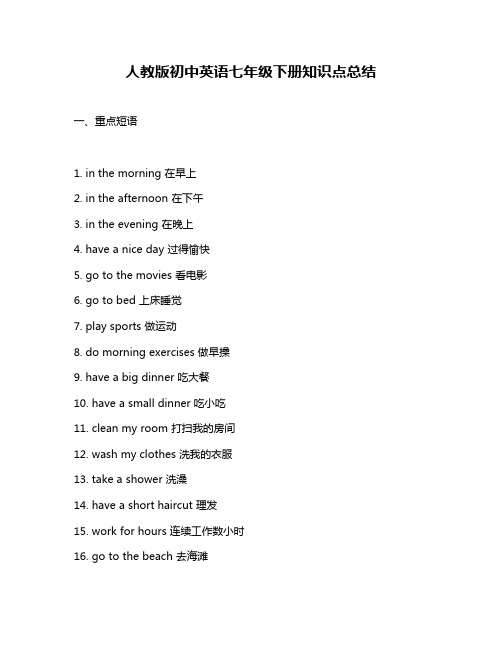
人教版初中英语七年级下册知识点总结一、重点短语1. in the morning 在早上2. in the afternoon 在下午3. in the evening 在晚上4. have a nice day 过得愉快5. go to the movies 看电影6. go to bed 上床睡觉7. play sports 做运动8. do morning exercises 做早操9. have a big dinner 吃大餐10. have a small dinner 吃小吃11. clean my room 打扫我的房间12. wash my clothes 洗我的衣服13. take a shower 洗澡14. have a short haircut 理发15. work for hours 连续工作数小时16. go to the beach 去海滩17. on the weekend 在周末18. listen to music 听音乐19. have a party 举办聚会20. watch TV 看电视21. play computer games 玩电脑游戏22. in the pool 在游泳池里23. go to the zoo 去动物园24. in the mountains 在山里25. have fun 玩得开心26. the great wall 长城27. many places of interest 名胜古迹28. be ready for 为……准备好29. stay healthy 保持健康30. how much 多少31. would you like 一些……吗?32. some noodles 一些面条33. order a pizza 定一个披萨饼34. make a phone order 电话订购35. would you like to do sth 你愿意做某事吗?36. want to do sth 想做某事37. would you like +名词你愿意要……吗?38. would you like +动词不定式你愿意……吗?39. choose some food 选择一些食物40. order the food 订购食物41. be careful 当心;小心42. not much 不多;少量的43. be ready to do sth 准备好做某事。
人教版七年级英语下册各知识点归纳总结
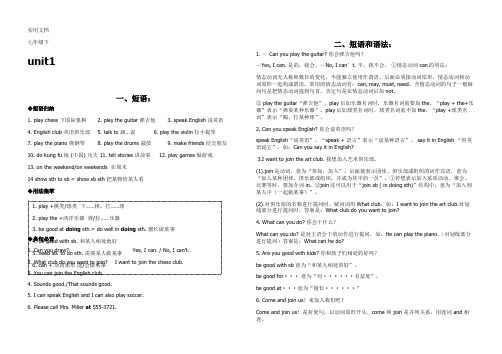
七年级下unit1一、短语:◆短语归纳1. play chess 下国际象棋2. play the guitar 弹吉他3. speak English 说英语4. English club 英语俱乐部5. talk to 跟…说6. play the violin 拉小提琴7. play the piano 弹钢琴8. play the drums 敲鼓9. make friends 结交朋友10. do kung fu 练 (中国) 功夫 11. tell stories 讲故事 12. play games 做游戏13. on the weekend/on weekends 在周末14 show sth to sb = show sb sth 把某物给某人看◆用法集萃◆典句必背1. Can you draw? Yes, I can. / No, I can’t.2. What club do you want to join? I want to join the chess club.3. You can join the English club.4. Sounds good./That sounds good.5. I can speak English and I can also play soccer.6. Please call Mrs. Miller at 555-3721.二、短语和语法:1. — Can you play the guitar? 你会弹吉他吗?—Yes, I can. 是的,我会。
—No, I can’t. 不,我不会。
①情态动词can的用法:情态动词无人称和数目的变化,不能独立使用作谓语,后面必须接动词原形,情态动词和动词原形一起构成谓语。
常用的情态动词有:can, may, must, need。
含情态动词的句子一般疑问句是把情态动词提到句首,否定句是在情态动词后加not。
人教版七年级下册英语语法知识点归纳总结
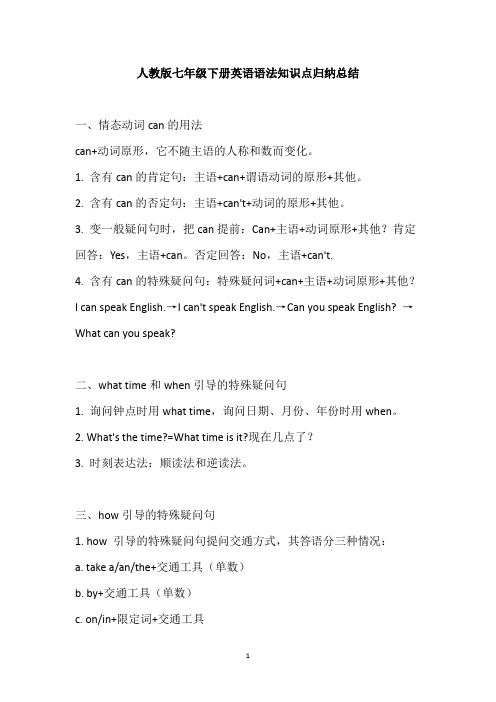
人教版七年级下册英语语法知识点归纳总结一、情态动词can的用法can+动词原形,它不随主语的人称和数而变化。
1. 含有can的肯定句:主语+can+谓语动词的原形+其他。
2. 含有can的否定句:主语+can't+动词的原形+其他。
3. 变一般疑问句时,把can提前:Can+主语+动词原形+其他?肯定回答:Yes,主语+can。
否定回答:No,主语+can't.4. 含有can的特殊疑问句:特殊疑问词+can+主语+动词原形+其他?I can speak English.→I can't speak English.→Can you speak English? →What can you speak?二、what time和when引导的特殊疑问句1. 询问钟点时用what time,询问日期、月份、年份时用when。
2. What's the time?=What time is it?现在几点了?3. 时刻表达法:顺读法和逆读法。
三、how引导的特殊疑问句1. how 引导的特殊疑问句提问交通方式,其答语分三种情况:a. take a/an/the+交通工具(单数)b. by+交通工具(单数)c. on/in+限定词+交通工具---How do you go to school every day?---I take a bus to go to school every day./I go to school by bus every day./I go to school on the bus every day.2. how far 用来提问距离,多远,其答语分为两种:(1)用长度单位表示:It is five kilometers.(2)用时间表示:It’s twenty minutes’walk.3. how long 用来提问时间,意为多久回答常用“for+段时”。
人教版七年级下册英语各单元知识点总结归纳
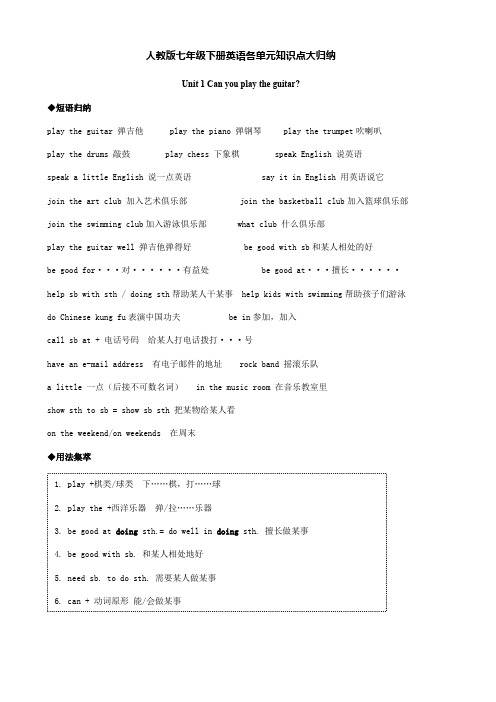
人教版七年级下册英语各单元知识点大归纳Unit 1 Can you play the guitar?◆短语归纳play the guitar 弹吉他 play the piano 弹钢琴 play the trumpet吹喇叭play the drums 敲鼓 play chess 下象棋 speak English 说英语speak a little English 说一点英语 say it in English 用英语说它join the art club 加入艺术俱乐部 join the basketball club加入篮球俱乐部join the swimming club加入游泳俱乐部 what club 什么俱乐部play the guitar well 弹吉他弹得好 be good with sb和某人相处的好be good for···对······有益处be good at···擅长······help sb with sth / doing sth帮助某人干某事 help kids with swimming帮助孩子们游泳do Chinese kung fu表演中国功夫 be in参加,加入call sb at + 电话号码给某人打电话拨打···号have an e-mail address 有电子邮件的地址 rock band 摇滚乐队a little 一点(后接不可数名词) in the music room 在音乐教室里show sth to sb = show sb sth 把某物给某人看on the weekend/on weekends 在周末◆用法集萃1. play +棋类/球类下……棋,打……球2. play the +西洋乐器弹/拉……乐器3. be good at doing sth.= do well in doing sth. 擅长做某事4. be good with sb. 和某人相处地好5. need sb. to do sth. 需要某人做某事6. can + 动词原形能/会做某事◆语法can 能;会;可以【用法】它本身有一定的含义,没有人称和数的变化,但不能单独作谓语,要和动词原形一起构成谓语。
人教版英语七年级下册课本知识点梳理
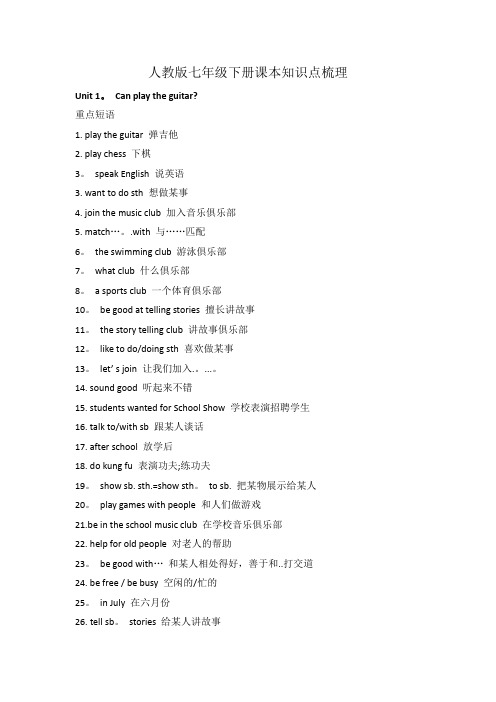
人教版七年级下册课本知识点梳理Unit 1。
Can play the guitar?重点短语1. play the guitar 弹吉他2. play chess 下棋3。
speak English 说英语3. want to do sth 想做某事4. join the music club 加入音乐俱乐部5. match…。
.with 与……匹配6。
the swimming club 游泳俱乐部7。
what club 什么俱乐部8。
a sports club 一个体育俱乐部10。
be good at telling stories 擅长讲故事11。
the story telling club 讲故事俱乐部12。
like to do/doing sth 喜欢做某事13。
let’ s join 让我们加入.。
...。
14. sound good 听起来不错15. students wanted for School Show 学校表演招聘学生16. talk to/with sb 跟某人谈话17. after school 放学后18. do kung fu 表演功夫;练功夫19。
show sb. sth.=show sth。
to sb. 把某物展示给某人20。
play games with people 和人们做游戏21.be in the school music club 在学校音乐俱乐部22. help for old people 对老人的帮助23。
be good with…和某人相处得好,善于和..打交道24. be free / be busy 空闲的/忙的25。
in July 在六月份26. tell sb。
stories 给某人讲故事27。
make friends with…和某人交朋友28。
call sb. at ……给某人打电话……29。
on the weekend 在周末30. help sb.(to)do sth. 帮助某人做某事31. help sb。
人教版七年级英语下册总复习知识点考点总结归纳
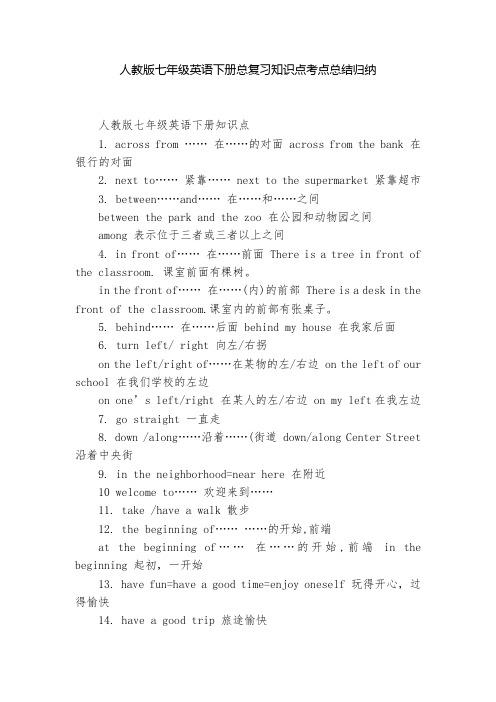
人教版七年级英语下册总复习知识点考点总结归纳人教版七年级英语下册知识点1. across from ……在……的对面 across from the bank 在银行的对面2. next to……紧靠…… next to the supermarket 紧靠超市3. between……and……在……和……之间between the park and the zoo 在公园和动物园之间among 表示位于三者或三者以上之间4. in front of……在……前面 There is a tree in front of the classroom. 课室前面有棵树。
in the front of……在……(内)的前部 There is a desk in the front of the classroom.课室内的前部有张桌子。
5. behind……在……后面 behind my house 在我家后面6. turn left/ right 向左/右拐on the left/right of……在某物的左/右边 on the left of our school 在我们学校的左边on one’s left/right 在某人的左/右边 on my left在我左边7. go straight 一直走8. down /along……沿着……(街道 down/along Center Street 沿着中央街9. in the neighborhood=near here 在附近10 welcome to……欢迎来到……11. take /have a walk 散步12. the beginning of…………的开始,前端at the beginning of……在……的开始,前端in the beginning 起初,一开始13. have fun=have a good time=enjoy oneself 玩得开心,过得愉快14. have a good trip 旅途愉快15. take a taxi 坐出租车16. 到达:get to +地方get here/ there/ home 到这/那/家 arrive in +大地方 I arrive in Beijing. arrive at +小地方I arrive at the bank. reach +地方17.go across 从物体表面横过 go across the street横过马路go through 从空间穿过 go through the forest穿过树林18.on + 街道的名称。
人教版人教版七年级下册英语知识点复习(完整版)
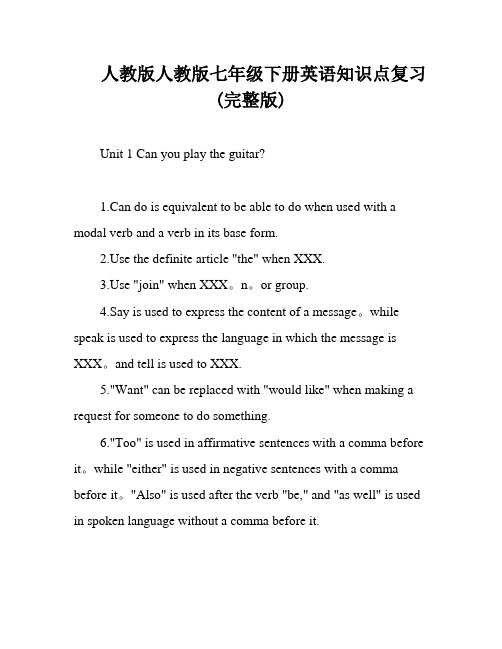
人教版人教版七年级下册英语知识点复习(完整版)Unit 1 Can you play the guitar?1.Can do is equivalent to be able to do when used with a modal verb and a verb in its base form.e the definite article "the" when XXX.e "join" when XXX。
n。
or group.4.Say is used to express the content of a message。
while speak is used to express the language in which the message is XXX。
and tell is used to XXX.5."Want" can be replaced with "would like" when making a request for someone to do something.6."Too" is used in affirmative sentences with a comma before it。
while "either" is used in negative sentences with a comma before it。
"Also" is used after the verb "be," and "as well" is used in spoken language without a comma before it.7."Be good at" is used to XXX or activity。
人教版七年级英语下册单元知识点总结(全册)
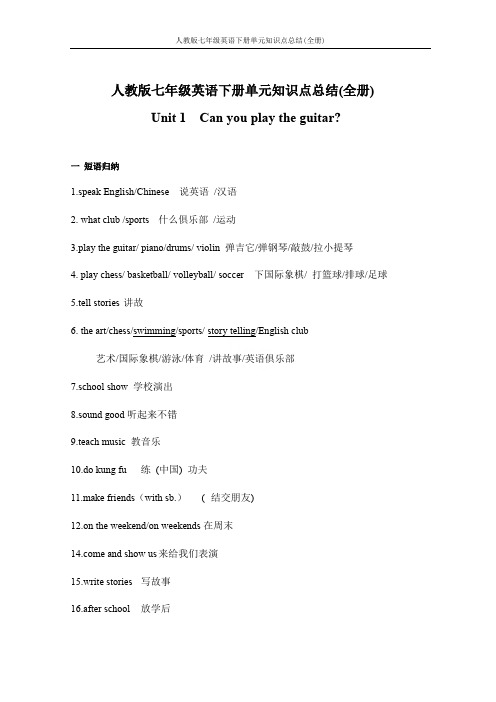
人教版七年级英语下册单元知识点总结(全册)Unit 1 Can you play the guitar?一短语归纳1.speak English/Chinese 说英语/汉语2. what club /sports什么俱乐部/运动3.play the guitar/ piano/drums/ violin 弹吉它/弹钢琴/敲鼓/拉小提琴4. play chess/ basketball/ volleyball/ soccer 下国际象棋/ 打篮球/排球/足球5.tell stories讲故6. the art/chess/swimming/sports/ story telling/English club艺术/国际象棋/游泳/体育/讲故事/英语俱乐部7.school show 学校演出8.sound good听起来不错9.teach music 教音乐10.do kung fu练(中国) 功夫11.make friends(with sb.)(结交朋友)12.on the weekend/on weekends在周末e and show us来给我们表演15.write stories写故事16.after school放学后17.English-speaking students说英语的学生18.play games 做游戏19.the Students’ Sports Center学生运动中心20.at the old people’s home在老人之家21.be in our school music festival 参加学校音乐节22.jion the music club加入音乐俱乐部二用法集萃1. play +棋类/球类下……棋,打……球2. play the +乐器弹/拉……乐器3. be good at doing sth.擅长做某事be good for.. 对… 有好处be good /kind to … 对… 友好4. be good with sb. 和某人相处地好; 善于应付(处理)…5. need(sb./sth.)to do… 需要(某人/某物)做….6. can + 动词原形能/会做某事7. a little + 不可数名词: 一点儿……9. like to do sth.或like doing sth. 喜欢做某事10.want to do…想做……11.What about…?…怎么样?(后面接Ving/代词/名词)12. talk用法: talk to/with sb. 跟某人说话talk about sth. 谈论某事tell 用法:tell sb sth. 告诉某人某事tell sb to do sth 告诉某人去做某事tell stories 讲故事say用法:say直接加说话的内容/itspeak用法:speak +语言13.help sb. with sth在某方面帮助某人= help sb.(to)do sth14.be free /busy有空/很忙15. call sb. at+号码拨打某人的……号码16. be in=join …成为…中的一员(P6)17.want …for the school show为学校表演招聘……三典句必背1. Can you draw? 你会画画吗?Yes, I can. / No, I can’t.是,我会。
- 1、下载文档前请自行甄别文档内容的完整性,平台不提供额外的编辑、内容补充、找答案等附加服务。
- 2、"仅部分预览"的文档,不可在线预览部分如存在完整性等问题,可反馈申请退款(可完整预览的文档不适用该条件!)。
- 3、如文档侵犯您的权益,请联系客服反馈,我们会尽快为您处理(人工客服工作时间:9:00-18:30)。
Unit 1 Can you play the guitar?一、单词与词组Guitar吉他sing 唱歌,swim游泳dance跳舞,draw画画,chess西洋棋Join: 表示“参加,加入”,此处指参加社团或组织,成为其中的成员。
Join the army 参军Join the NBA 加入美国篮球协会Join the art/sports/music/English/chess club 参加体育/音乐/英语/象棋俱乐部乐器类+the play the guitar /the violin/the drums/the piano非乐器类+ the play soccer/ basketball/volleyball/football/tennis/badminton(英式足球/ 篮球/ 排球/英式足球,美式橄榄球/网球/羽毛球)、Be good at+ sth./doing sth. 擅长做某事Be good with 与…相处得好Be good to 对…友好=be friendly toBe good for 对…有好处want to do sth /want sb to do sth 想要某人做某事Like to do sth.特指某一次的动作;like doing sth. 强调经常性的爱好。
两者都表示喜欢做某事,在仅仅表达“喜欢”时两者可以通用。
Tell: Tell stories 讲故事tell sb. sth. /to do sth. /not to do sth.告诉某人某事/不要做某事Help: Help sb. to do sth. /help sb. with sth./ help sb. do sth. 帮助某人做某事Help yourself/sb. (to sth.)把某物(尤其是指食物,饮料等)拿给自己/某人can't help doing sth.情不自禁做某事Call at 用于打某人的电话 e.g. Call Mr.Brown at 293-7742Home:1. 表示动态概念。
意思是“回家”,“到家”。
前面不加介词。
这里的home 是副词,表示目的地。
e.g. 1)When do you go home every day?你每天什么时候回家?2)He drives home after work.他下班的开车回家。
3)She often does some shopping on his way home. 她经常在回家途中买些东西。
2. at home 表示静态概念。
意思是“在家”。
这里的home是名词,表示具体地点。
e.g. 1) Is she at home? 她在家吗?2)He left his book at home. 他把书放在家里了。
Go home 回家get home 到家at home 在家Also 也,而且;较正式,用于肯定句,紧跟动词。
e.g. I can speak English and I can also speak Chinese. 我能说英文也能说中文。
Too 多用于口语,放在句末。
E.g. Me too.他也没有完成。
Either 多用于否定句,放在句末。
E.g. He hasn’t finished, either.Show sb. sth. /show sth. To sb. 展示给某人看Show time 作秀时间,表演开始talk show 脱口秀(美国脱口秀节目)Talk to sb 和某人交谈重点句型Can you swim? 你会游泳吗?Yes, I can./ No, I can’t. 是的,我会。
/不,我不会What can you do ?你会什么?我会跳舞。
/ 我不会唱歌。
I can dance./ I can’t sing.What club do you want to join?你们想加入哪个俱乐部?We want to join the chess club.我们想加入象棋俱乐部。
Unit 2 What time do you go to school?一、单词与词组Run跑, brush v.刷:刷净n 刷子, clean v.打扫;弄干净adj. 干净的exercise v&n 锻炼,练习,walk n&v 行走,步行. work n&v 工作taste v.品尝n.味道,滋味usually adv.通常地,一般地, never adv. 从不,绝不quarter n. 一刻钟,四分之一,forty num.刷牙, eat breakfast 吃早餐, take a shower洗淋五十Get dressed 穿上衣服, brush one’s teeth浴, do one’s homework做作业, take a walk 散步on weekends 在周末lots of 许多either...or 要么。
要么on school days 上学日never 绝不after dinner 晚餐后at night 二、语法点时间连词:when=while 当…时then 然后after that 在那之后at+时间点/sb. do sth. at about +时间点for breakfast/lunch/dinner…睡觉go to bed=go to sleep 睡觉take a tap 午休,小睡一会儿反:get up 起床take a +名词从事某项活动Time 表时间,不可数;表次数,可数。
Some times 几次sometimes 有时some time 一段时间sometime 某个时候系动词It tastes/smells/looks/sounds/feels尝起来/闻起来/看起来/听起来/摸起来(含被动意味,但不能用被动语态)tastes/smells/looks/sounds/feels+like尝起来/闻起来/看起来/听起来/摸起来像…二选一either…or…两者都不neither…nor… 连接两个主语时,其谓语动词应与最近的一个主语在人称和数上保持一致,即"就近原则"。
e.g. Either you or I am going there tomorrow. 明天要么你去那里,要么我去那里。
Neither dad nor mum is at home today. 今天父母都不在家。
Here引导的倒装句表位置的副词放在句首时,如主语是代词,不倒装;表位置的副词放在句首时,如主语是名词,要用全部倒装。
e.g. Here it is! Here he comes. (代词不倒装)Here is your ticket. Here comes the bus. (名词倒装)关于时间的问法(1)以when提问,“什么时候”可以是较长的时间段,也可以是较短的时间点①When is your birthday? 你的生日是什么时候?②My birthday is Dec. 29th. 我的生日是12月29日。
这里就是指一天的时间段①When do you go home? 你几点回家?②I go home at 4:30 p.m. 我下午4:30回家.这里when问的是具体的时间。
(2)具体几点我们通常用what time提问①What time is it now? 现在几点了?or What’s the time?几点了?s 9:26. 现在九点二十六。
Twenty six past nineIt’②What time is it by your watch? 你手表几点了?8:36,哦,它慢了50分钟。
-----twenty four to nineIt’s8:36. Oh, It’s 50 minutes late③What time do you get up? 你几点起床?I get up at 6:00 a.m. 我早上6点起床。
Half past ....几点半A quarter to 差一刻钟到几点Need to do sthNeed sb to do sth 需要做某事三、重要句型What time do you usually get up ?I usually get up at six thirty.What time does Rick eat breakfast.He eats b reakfast at seven o’clock.When does Scott go to work?He always goes to work at eleven o’clock.Unit 3 How do you get to school?一、单词Train 火车, bus公共汽车, subway地铁, bike自行车, car小汽车, boat小船, river河,江, year年, minute 分钟, kilometer千米,公里, sixty六十, seventy,七十eighty八十, ninety 九十, hundred一百, ride v.骑n 旅程, drive v.开车, live v.居住,生活leave v.离开, cross v.穿过,越过二,词组Take the train/ bus乘火车/公共汽车go by bike/subwayride a bike骑自行车driver a car 开车think of 想起between ....and ... 在...和...之间Leave home/school 离开家/学校come true实现Be afraid to do sth 害怕做某事Be afraid + 从句害怕Be afraid of doing sth 害怕做某事many students是单指学生数量多,侧重数量many of the students是指学生中很多一部分,强调部分too…太… 1. too much意为“太多”,+不可数名词/+动词。
e.g.I had too much housework to do yesterday . 昨天我有太多的家务活要干。
She talks too much . 她说话太多。
much too意思是“过分,太”,隐含了过分而不恰当之意,much too+形容词或副词,不+动词。
e.g.The question is much too difficult . 这道题太难了。
You’re walking much too fast . 你走得太快了。
